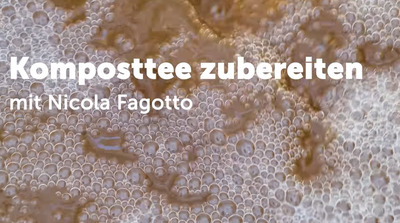{Tool} Organic miracle cure: Nicola Fagotto explains how to make the best compost tea. [Biologisches Wundermittel: Nicola Fagotto erklärt, wie man den besten Komposttee herstellt.] Creator(s): Geissbühler, Olivier. Issuing Organisation(s): Delinat. (2024)
|
Video (MP4)
- Published Version
- French/Francais
155B | |
![[thumbnail of 2024-11-01 11_52_02-(14) Biologisches Wundermittel_ Nicola Fagotto erklärt, wie man den besten Kompo.png]](/54283/2.hassmallThumbnailVersion/2024-11-01%2011_52_02-%2814%29%20Biologisches%20Wundermittel_%20Nicola%20Fagotto%20erkl%C3%A4rt%2C%20wie%20man%20den%20besten%20Kompo.png)  Preview |
Image (PNG)
- Cover Image
- French/Francais
2MB |
Document available online at: https://www.youtube.com/watch?v=Sva1f6oTM1k
Summary in the original language of the document
In this video, soil expert Nicola Fagotto shows how to make a highly effective compost tea using simple ingredients such as compost, water, algae powder, pea flour and sugar.
Summary translation
In diesem Video zeigt Bodenexperte Nicola Fagotto, wie man mit einfachen Zutaten wie Kompost, Wasser, Algenpulver, Erbsenmehl und Zucker einen hochwirksamen Komposttee herstellen kann.
| EPrint Type: | Practice tool |
|---|---|
| Teaser: | Compost tea: a boost for the soil and plants |
| What problem does the tool address?: | The mineral diversity available to a plant via the microbiology in the soil is the basis for healthy plants. Healthy plants produce high-quality fruit with complex aromas and flavors. With a fermented (actively aerated) compost tea rich in microorganisms, you can achieve just that. |
| What solution does the tool offer?: | Organic compost tea accelerates the decomposition of organic material in the soil, promotes the development of mycorrhiza on plant roots, improves nutrient uptake by plants, increases the efficiency of nutrient utilization and stimulates plant growth. Compost tea is a liquid organic preparation obtained by oxygenating and fermenting high-quality compost in water. During the brewing process, beneficial microorganisms multiply rapidly so that a large area can be treated with only small amounts of compost. |
| Country: | Germany |
| Type of Practice Tool: | Video |
| Keywords: | grapes, viticulure, nutrient management, organic fertilizers, composts, plant nutrition, soil quality, soil biology, soil microorganisms |
| Agrovoc keywords: | Language Value URI English grapes http://aims.fao.org/aos/agrovoc/c_3359 English viticulture http://aims.fao.org/aos/agrovoc/c_8277 English nutrient management http://aims.fao.org/aos/agrovoc/c_330697 English organic fertilizers http://aims.fao.org/aos/agrovoc/c_4592 English composts http://aims.fao.org/aos/agrovoc/c_1795 English plant nutrition http://aims.fao.org/aos/agrovoc/c_16379 English soil quality http://aims.fao.org/aos/agrovoc/c_a9645d28 English soil biology http://aims.fao.org/aos/agrovoc/c_7160 English soil microorganisms http://aims.fao.org/aos/agrovoc/c_36167 |
| Subjects: | Soil > Soil quality Soil > Soil quality > Soil biology Soil Crop husbandry > Production systems > Fruit and berries > Viticulture Farming Systems > Farm nutrient management |
| Research affiliation: | European Union > Horizon Europe > OrganicAdviceNetwork > selected tools European Union > Organic Farm Knowledge |
| Horizon Europe or H2020 Grant Agreement Number: | 101134850 |
| Related Links: | https://organic-farmknowledge.org/tool/54283, https://organic-farmknowledge.org/tool/54003, https://organic-farmknowledge.org/tool/54041, https://organic-farmknowledge.org/tool/54269, https://organic-farmknowledge.org/tool/54256 |
| Project ID: | OFK |
| Deposited By: | Rüger, Madelaine Lea |
| ID Code: | 54283 |
| Deposited On: | 05 Nov 2024 07:27 |
| Last Modified: | 14 Mar 2025 14:44 |
| Document Language: | German/Deutsch, French/Francais |
| Status: | Published |
Repository Staff Only: item control page

 Download Statistics
Download Statistics Download Statistics
Download Statistics
